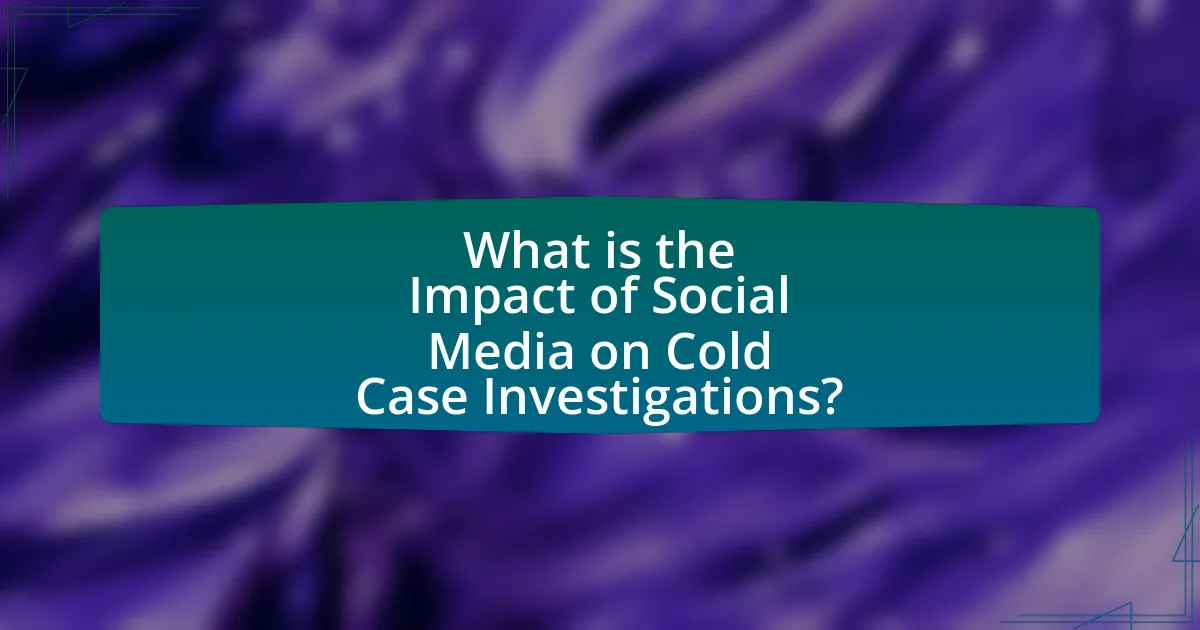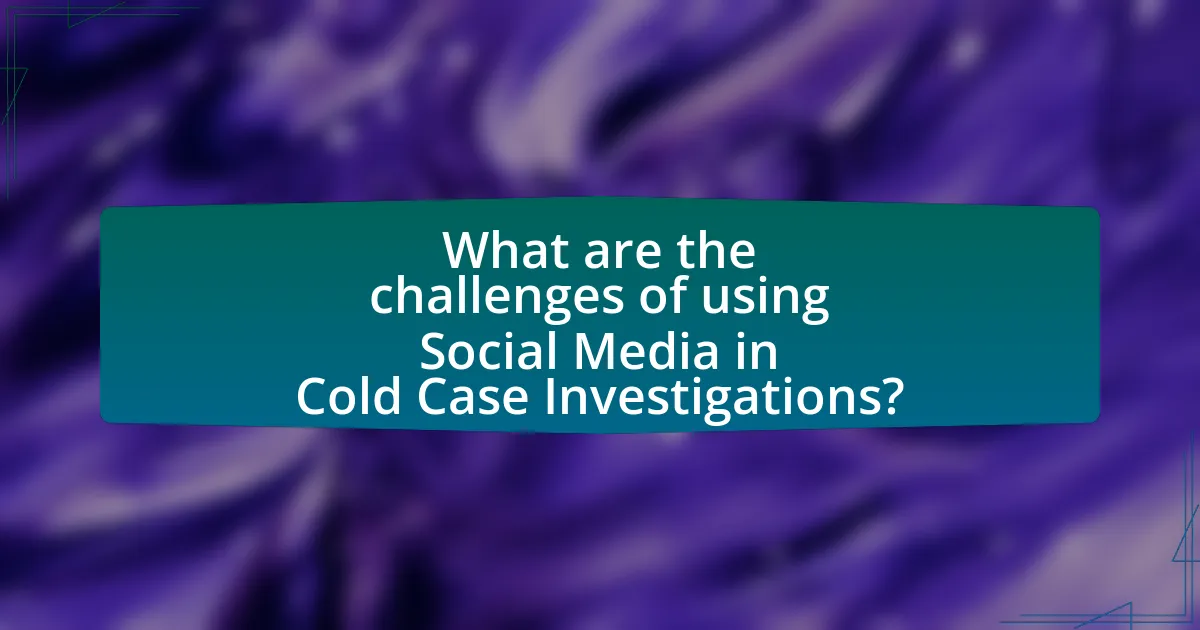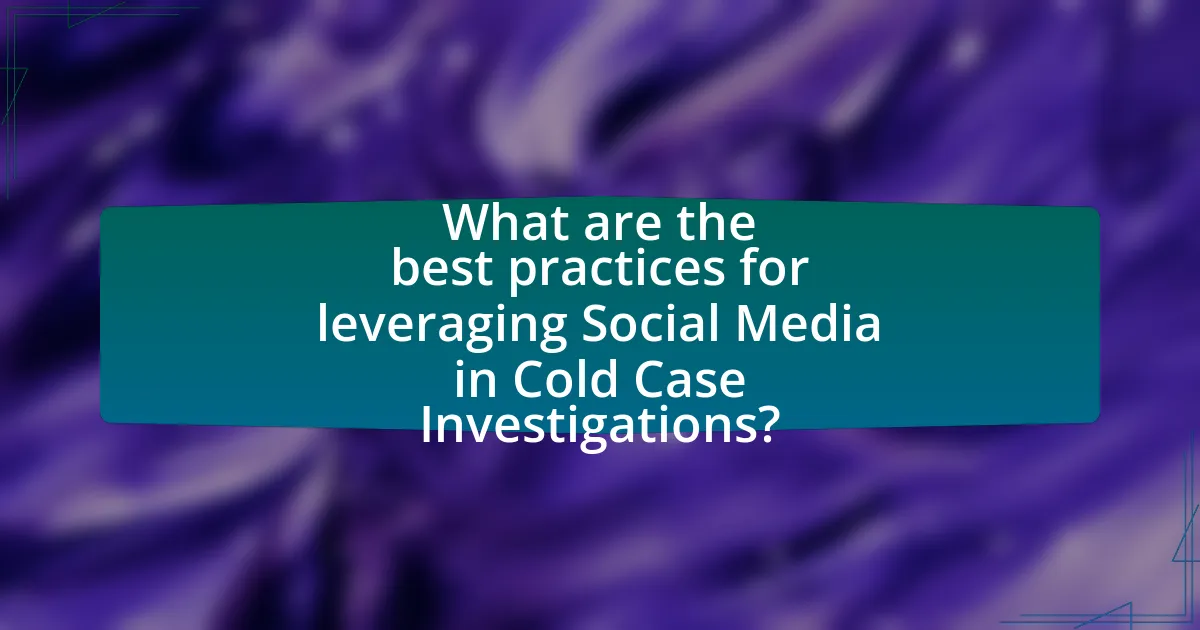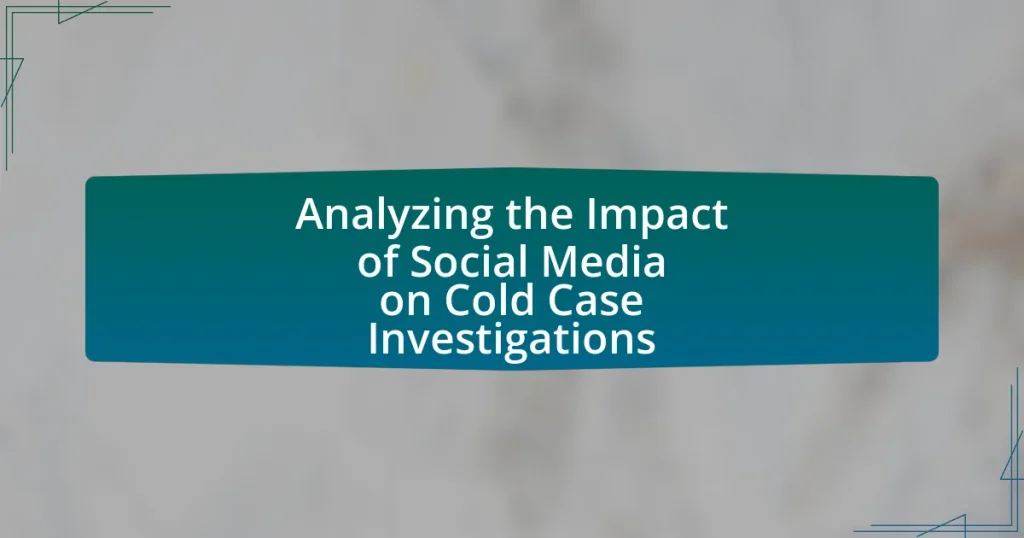The article analyzes the impact of social media on cold case investigations, highlighting how platforms like Facebook and Twitter facilitate information dissemination and public engagement. It discusses the transformation of investigative practices through community involvement, the gathering of new evidence, and the challenges posed by misinformation and privacy concerns. Key examples, such as the cases of Angela Blount and the Golden State Killer, illustrate the effectiveness of social media in generating leads and revitalizing interest in unsolved cases. Additionally, the article outlines best practices for law enforcement agencies to leverage social media effectively, emphasizing the importance of community collaboration and technological advancements in future investigations.

What is the Impact of Social Media on Cold Case Investigations?
Social media significantly impacts cold case investigations by facilitating the dissemination of information and engaging the public in solving cases. Platforms like Facebook and Twitter allow law enforcement agencies to share details about unsolved cases, reaching a broader audience and potentially eliciting tips from individuals who may have relevant information. For instance, the case of the 1986 murder of 15-year-old Angela Blount saw renewed interest and leads after a social media campaign by the police, resulting in new witnesses coming forward. Additionally, social media can help create online communities that support families of victims, raising awareness and keeping cases in the public eye, which can lead to breakthroughs in investigations.
How has social media changed the landscape of cold case investigations?
Social media has significantly transformed cold case investigations by facilitating broader public engagement and information sharing. Platforms like Facebook and Twitter allow law enforcement agencies to disseminate details about unsolved cases to a vast audience, increasing the likelihood of receiving tips and leads from the public. For instance, the case of the Golden State Killer saw renewed interest and crucial tips generated through social media campaigns, ultimately leading to an arrest in 2018. Additionally, social media enables the formation of online communities dedicated to discussing and investigating cold cases, which can result in collaborative efforts that uncover new evidence or insights. This shift towards a more participatory approach in investigations has proven effective in revitalizing interest in long-dormant cases and leveraging collective knowledge for resolution.
What role does social media play in gathering new evidence?
Social media plays a crucial role in gathering new evidence by providing a platform for the dissemination and collection of information related to cold cases. Investigators can access user-generated content, such as posts, images, and videos, which may contain vital clues or eyewitness accounts. For instance, a study by the International Association of Chiefs of Police found that 80% of law enforcement agencies utilize social media to solicit tips and gather information from the public, significantly enhancing their investigative capabilities. This direct engagement with the community can lead to the discovery of new leads and evidence that may not have been available through traditional investigative methods.
How do social media platforms facilitate public engagement in cold cases?
Social media platforms facilitate public engagement in cold cases by providing a space for information sharing, community interaction, and awareness-raising. These platforms enable law enforcement agencies and advocacy groups to disseminate details about unsolved cases, encouraging users to share their insights or tips. For instance, the use of hashtags related to specific cases can amplify visibility, leading to increased public interest and participation. Research indicates that cases highlighted on social media often receive more tips and leads than those that are not, demonstrating the effectiveness of these platforms in mobilizing community involvement.
Why is social media important for solving cold cases?
Social media is important for solving cold cases because it facilitates widespread information sharing and community engagement. Platforms like Facebook and Twitter allow law enforcement agencies to disseminate details about unsolved cases to a vast audience, increasing the likelihood of receiving tips or leads from the public. For instance, the case of the 1986 murder of 15-year-old Angela Blount saw renewed interest and potential breakthroughs after investigators shared her story on social media, leading to new witnesses coming forward. Additionally, social media can help connect families of victims with advocates and organizations that specialize in cold cases, further amplifying their reach and resources.
What are the advantages of using social media in investigations?
The advantages of using social media in investigations include enhanced information gathering, increased public engagement, and real-time updates. Social media platforms allow investigators to access a vast amount of user-generated content, which can provide leads and insights that traditional methods may overlook. For instance, a study by the International Association of Chiefs of Police found that 70% of law enforcement agencies utilize social media to gather intelligence and engage with the community. Additionally, social media facilitates the rapid dissemination of information, enabling investigators to reach a wider audience quickly, which can lead to tips and assistance from the public.
How does social media help in reaching a wider audience?
Social media helps in reaching a wider audience by providing platforms that facilitate rapid information sharing and engagement. These platforms, such as Facebook, Twitter, and Instagram, enable users to disseminate content to vast networks instantly, often resulting in viral reach. For instance, a study by Pew Research Center indicates that 69% of adults in the U.S. use social media, which significantly amplifies the potential audience for any message or campaign. Additionally, social media algorithms prioritize content that generates engagement, further enhancing visibility and outreach.

What are the challenges of using Social Media in Cold Case Investigations?
The challenges of using social media in cold case investigations include the overwhelming volume of information, the potential for misinformation, and privacy concerns. Investigators face difficulties in sifting through vast amounts of user-generated content, which can lead to critical evidence being overlooked. Misinformation can spread rapidly on social platforms, complicating the investigation process and potentially leading to false leads. Additionally, privacy issues arise when attempting to access private accounts or data, which can hinder the collection of relevant information. These factors collectively pose significant obstacles in leveraging social media effectively for solving cold cases.
What potential pitfalls exist when relying on social media for investigations?
Relying on social media for investigations presents several potential pitfalls, including misinformation, privacy concerns, and the challenge of verifying sources. Misinformation can spread rapidly on social media platforms, leading investigators to base decisions on false or misleading information, which can derail investigations. Privacy concerns arise when investigators access personal data without consent, potentially violating legal and ethical standards. Additionally, the challenge of verifying sources complicates the reliability of information, as users may post unverified claims or impersonate others, making it difficult to ascertain the truth. These factors highlight the need for caution and critical evaluation when utilizing social media in investigative contexts.
How can misinformation on social media affect cold case investigations?
Misinformation on social media can significantly hinder cold case investigations by leading to false leads and misdirected resources. When inaccurate information circulates, it can create confusion among investigators and the public, resulting in wasted time and effort on non-viable tips. For instance, a study published in the journal “Crime Science” highlights that misinformation can distort public perception and complicate the investigative process, as individuals may pursue leads based on erroneous claims rather than verified facts. This diversion can ultimately delay the resolution of cases and undermine the credibility of law enforcement agencies.
What are the privacy concerns associated with using social media data?
Privacy concerns associated with using social media data include unauthorized access to personal information, data breaches, and the potential for misuse of sensitive data. Social media platforms often collect extensive user data, which can be exploited by third parties for targeted advertising or even identity theft. According to a 2021 report by the Pew Research Center, 81% of Americans feel that the potential risks of companies collecting their data outweigh the benefits. Furthermore, the Cambridge Analytica scandal highlighted how personal data can be harvested without consent, raising significant ethical questions about privacy in the digital age. These concerns underscore the need for stringent data protection regulations and user awareness regarding the implications of sharing personal information online.
How do law enforcement agencies utilize social media in cold cases?
Law enforcement agencies utilize social media in cold cases primarily to gather information and engage the public. They post details about unsolved cases, including images and descriptions of victims or suspects, to reach a wider audience and solicit tips. For instance, the FBI and local police departments have successfully used platforms like Facebook and Twitter to share case updates, leading to new leads and witness testimonies. A notable example is the case of the 1986 murder of 15-year-old Angela Blount, where a social media campaign resulted in a tip that led to a suspect’s arrest. This demonstrates the effectiveness of social media in revitalizing interest and involvement in cold cases, ultimately aiding investigations.
What strategies do police departments employ to engage the public online?
Police departments employ various strategies to engage the public online, including active social media presence, community outreach programs, and interactive content. By utilizing platforms like Facebook, Twitter, and Instagram, police departments share updates, safety tips, and crime alerts, fostering transparency and trust. For instance, the Los Angeles Police Department has effectively used social media to solicit tips on cold cases, resulting in increased public involvement and assistance in investigations. Additionally, departments often host live Q&A sessions and virtual town halls, allowing community members to interact directly with law enforcement, thereby enhancing community relations and encouraging collaboration in solving cases.
How do agencies verify information gathered from social media?
Agencies verify information gathered from social media by cross-referencing data with multiple credible sources and employing digital forensics techniques. They analyze the metadata of posts, such as timestamps and geolocation, to assess authenticity. Additionally, agencies often utilize fact-checking tools and collaborate with social media platforms to trace the origin of information. For instance, a study by the International Association of Chiefs of Police highlights that law enforcement agencies increasingly rely on social media analytics to corroborate claims, ensuring that the information aligns with known facts and other evidence in ongoing investigations.

What are the best practices for leveraging Social Media in Cold Case Investigations?
The best practices for leveraging social media in cold case investigations include engaging with the public to gather tips, utilizing targeted ads to reach specific demographics, and monitoring relevant hashtags for new information. Engaging with the public can lead to valuable insights, as seen in cases where social media campaigns have revived interest and prompted witnesses to come forward. Targeted ads can effectively reach individuals who may have information, as demonstrated by successful campaigns in various law enforcement agencies. Monitoring hashtags allows investigators to stay updated on discussions related to the case, facilitating the discovery of new leads. These practices enhance the investigative process by tapping into the vast network of social media users, increasing the likelihood of solving cold cases.
What techniques can investigators use to maximize social media’s effectiveness?
Investigators can maximize social media’s effectiveness by employing targeted outreach, utilizing analytics tools, and engaging with the community. Targeted outreach involves identifying specific demographics or groups relevant to the case and crafting messages that resonate with them, which can increase the likelihood of obtaining valuable information. Utilizing analytics tools allows investigators to track engagement metrics, such as shares and comments, helping them understand which posts are most effective and adjust their strategies accordingly. Engaging with the community fosters trust and encourages individuals to share information, as seen in cases where local social media campaigns have led to significant tips and leads. For example, the case of the Golden State Killer saw investigators use social media to solicit information, resulting in a breakthrough that led to an arrest.
How can investigators create compelling content to attract public attention?
Investigators can create compelling content to attract public attention by utilizing engaging storytelling techniques and leveraging visual elements. Engaging narratives that highlight the emotional aspects of a case can resonate with the audience, making them more likely to share and discuss the content. For instance, incorporating real-life testimonials or dramatic reenactments can enhance the emotional connection. Additionally, using high-quality images, infographics, and videos can capture attention more effectively than text alone. Research indicates that posts with visuals receive 94% more views than those without, underscoring the importance of visual content in attracting public interest.
What are the best platforms for sharing cold case information?
The best platforms for sharing cold case information include social media sites like Facebook, Twitter, and Reddit, as well as dedicated websites such as Websleuths and the Charlie Project. These platforms facilitate community engagement and allow users to share insights, tips, and information that may assist in solving cold cases. For instance, Facebook groups focused on specific cases often attract individuals who have relevant information or expertise, while Reddit threads can generate discussions that lead to new leads. Additionally, Websleuths and the Charlie Project provide structured environments for discussing and documenting cold cases, enhancing visibility and collaboration among users.
What role does community involvement play in social media-driven investigations?
Community involvement is crucial in social media-driven investigations as it enhances information gathering and increases public engagement. When communities participate, they contribute local knowledge and insights that can lead to new leads or evidence in cold cases. For instance, the case of the Golden State Killer saw significant breakthroughs due to tips from the public shared via social media platforms, demonstrating how collective efforts can aid law enforcement. Additionally, community involvement fosters a sense of shared responsibility, encouraging individuals to actively participate in solving cases, which can result in a higher volume of actionable information.
How can community tips be effectively integrated into investigations?
Community tips can be effectively integrated into investigations by establishing clear communication channels and utilizing technology to analyze and prioritize the information received. Law enforcement agencies can create dedicated platforms, such as hotlines or social media pages, where community members can submit tips easily. For instance, the use of social media platforms has been shown to increase public engagement, as evidenced by the 2018 case of the Golden State Killer, where tips from social media led to significant breakthroughs. Additionally, employing data analytics tools can help investigators sift through large volumes of tips, identifying patterns and relevant information that can guide the investigation process. This approach not only enhances the quality of leads but also fosters community trust and collaboration in solving cold cases.
What are the benefits of fostering a collaborative online community?
Fostering a collaborative online community enhances information sharing, which is crucial for solving cold cases. Such communities enable diverse individuals to contribute insights, share resources, and provide emotional support, leading to increased engagement and motivation among participants. Research indicates that collaborative efforts can significantly improve problem-solving outcomes; for instance, a study published in the Journal of Social Media in Society found that online collaboration can lead to a 30% increase in the speed of information dissemination. This accelerated sharing of knowledge can directly impact cold case investigations by generating new leads and perspectives that may not have been considered by law enforcement.
What are the future trends in using social media for cold case investigations?
Future trends in using social media for cold case investigations include enhanced data analytics, increased public engagement, and the use of artificial intelligence for pattern recognition. Enhanced data analytics will allow law enforcement to sift through vast amounts of social media data to identify potential leads and connections that were previously overlooked. Increased public engagement through platforms like Facebook and Twitter will enable investigators to solicit tips and information directly from the community, leveraging the collective knowledge of the public. The integration of artificial intelligence will facilitate the analysis of social media interactions, helping to identify patterns or anomalies that could provide new insights into unsolved cases. These trends are supported by the growing use of social media as a tool for real-time information sharing and community involvement in criminal investigations.
How might advancements in technology influence social media’s role in investigations?
Advancements in technology significantly enhance social media’s role in investigations by improving data collection, analysis, and dissemination. For instance, the integration of artificial intelligence allows law enforcement to analyze vast amounts of social media data quickly, identifying patterns and connections that may lead to breakthroughs in cold cases. Additionally, geolocation features enable investigators to track the movements of individuals in real-time, providing critical context to ongoing investigations. A study by the International Association of Chiefs of Police highlights that 80% of law enforcement agencies now utilize social media for investigative purposes, demonstrating its growing importance in solving cases.
What emerging platforms could become significant in cold case investigations?
Emerging platforms that could become significant in cold case investigations include social media networks, crowdsourcing websites, and specialized forensic databases. Social media platforms like Facebook and Twitter allow law enforcement to engage with the public, share information, and solicit tips from a wider audience, which has proven effective in solving cases. Crowdsourcing websites, such as Reddit and specialized platforms like Websleuths, enable amateur sleuths to collaborate and share insights, potentially uncovering new leads. Additionally, forensic databases that utilize artificial intelligence and machine learning can analyze vast amounts of data to identify patterns and connections that may not be immediately apparent, enhancing investigative efforts. These platforms have already shown promise in various cases, demonstrating their potential to significantly impact cold case investigations.
What practical tips can investigators follow when using social media for cold cases?
Investigators can enhance their cold case inquiries by utilizing social media effectively. First, they should create dedicated profiles on platforms like Facebook and Twitter to engage with the public and share case details. This approach allows for direct interaction with potential witnesses or individuals who may have information. Additionally, investigators should utilize targeted ads to reach specific demographics that may have insights related to the case, as studies show that social media ads can significantly increase visibility among relevant audiences.
Moreover, monitoring relevant hashtags and groups can help investigators identify discussions or posts related to the case, providing leads that may not be accessible through traditional methods. Engaging with online communities can also foster trust and encourage individuals to come forward with information. Furthermore, investigators should analyze user-generated content, such as photos or videos, that may provide new evidence or context to the case.
Lastly, maintaining a consistent and respectful online presence is crucial, as it builds credibility and encourages community support. By following these practical tips, investigators can leverage social media as a powerful tool in solving cold cases.


